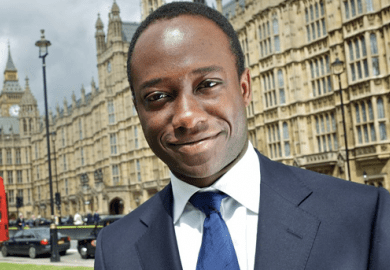Sam Gyimah has replaced Jo Johnson as universities minister in the UK’s Cabinet reshuffle.
Mr Gyimah, the former prisons minister, took on the role spanning the Department for Education and the Department for Business, Energy and Industrial Strategy after Mr Johnson was appointed transport minister and minister for London.
On Twitter, Mr Johnson said that universities were “our greatest asset [and the] best thing about this country”. He said he was proud of his reforms – especially the teaching excellence framework and the Higher Education and Research Act – and that Mr Gyimah would be a “brilliant” successor.
Mr Gyimah, the MP for East Surrey since 2010, is no stranger to the DfE, having served as a parliamentary under-secretary of state in the department between 2015 and 2016. He supported Remain in the run-up to the referendum on the UK’s membership of the EU.
A former Goldman Sachs investment banker, Mr Gyimah read politics, philosophy and economics at the University of Oxford, where he was president of the Oxford Union.
Dame Janet Beer, president of Universities UK and vice-chancellor of the University of Liverpool, said that she looked forward to working with Mr Gyimah "to develop policy that supports universities to maximise their positive impact on the economy, society and students".
"The promised review of tertiary education funding in England and establishing the new regulatory framework and Office for Students will likely be top of the new minister's in-tray," Dame Janet said.
"Improving post-study work visas for international students, supporting universities’ role in promoting social mobility and securing our long-term participation in the European programmes Horizon 2020 and Erasmus+ should also be priorities.”
Mr Johnson, who was appointed universities and science minister after the Conservatives’ general election victory, leaves his position with a number of policy achievements, including pushing through England’s first higher education legislation since 2010. The Higher Education and Research Act, which received parliamentary approval in April 2017, almost one year after its first reading, created a new super-regulator for higher education, the Office for Students.
The OfS came into effect on 1 January and is tasked with driving up choice and competition in the English sector, but its inception has been overshadowed by the decision to appoint controversial journalist Toby Young as one of its 15 board members. Mr Young quit the board on 9 January after a heated parliamentary debate on his appointment, in which Mr Johnson robustly defended the Spectator columnist’s role at the regulator.
The TEF was Mr Johnson’s other signature policy, creating a sector-wide audit of teaching standards and student outcomes, the first results of which were published last summer.
Mr Johnson had adopted a more confrontational approach in recent months, sparking a national debate in June when he criticised the pay awards of Russell Group vice-chancellors. He also became increasingly critical of the “no-platforming” of controversial speakers and what he saw as restrictions on freedom of speech on campus.
Mr Gyimah’s selection follows the appointment of Damian Hinds, formerly a work and pensions minister, as education secretary. Greg Clark has remained in post as business secretary.
Register to continue
Why register?
- Registration is free and only takes a moment
- Once registered, you can read 3 articles a month
- Sign up for our newsletter
Subscribe
Or subscribe for unlimited access to:
- Unlimited access to news, views, insights & reviews
- Digital editions
- Digital access to THE’s university and college rankings analysis
Already registered or a current subscriber?








